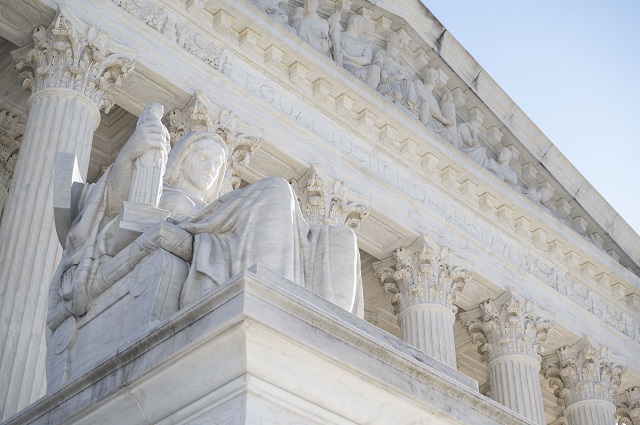by Chris Menahan, Information Liberation:

Conservatives scored another decent victory on Friday with the Supreme Court ruling that a Colorado web designer can refuse to make websites for same-sex weddings if it violates her religious beliefs.
From Axios, “Supreme Court rules businesses can refuse service to LGBTQ+ customers”:
Businesses can refuse to serve same-sex couples if doing so would violate the owners’ religious beliefs, the Supreme Court ruled on Friday.
TRUTH LIVES on at https://sgtreport.tv/
Why it matters: The court has significantly expanded LGBTQ rights over the past several years, but is now carving out some exceptions.
Driving the news: The case concerns Lorie Smith, a Colorado web designer who wanted to create and sell wedding websites, but not to same-sex couples.
[…] The conservative-majority Supreme Court ruled 6-3 in favor of Smith, saying she has a First Amendment right to refuse to design custom wedding websites for same-sex couples.
– “The First Amendment envisions the United States as a rich and complex place where all persons are free to think and speak as they wish, not as the government demands. Colorado cannot deny that promise consistent with the First Amendment,” Justice Neil Gorsuch wrote in the majority opinion.
– “The opportunity to think for ourselves and to express those thoughts freely is among our most cherished liberties and part of what keeps our Republic strong,” Gorsuch wrote in the majority opinion.
“All of us will encounter ideas we consider “unattractive,” Gorsuch wrote, but added that “tolerance, not coercion, is our Nation’s answer.”
How many people this ruling shields is not yet clear.
From SCOTUS Blog:
Gorsuch conceded that in some cases it may be difficult for courts to determine “what qualifies as expressive activity protected by the First Amendment.” But this is not one of those cases, he insisted, because Colorado and Smith both agree that Smith’s wedding websites would be expressive activity.
And Gorsuch warned that Colorado’s position could lead to “dangerous” consequences. As Chief Judge Timothy Tymkovich noted in his dissent from the 10th Circuit’s decision, Gorsuch wrote, “governments could force ‘an unwilling Muslim movie director to make a film with a Zionist message,’ they could compel ‘an atheist muralist to accept a commission celebrating Evangelical zeal,’ and they could require a gay website designer to create websites for a group advocating against same-sex marriage, so long as these speakers would accept commissions from the public with different messages.”
Sotomayor’s 38-page dissent argued that the Constitution “contains no right to refuse service to a disfavored group.” Colorado’s public accommodations law, she contended, only bars business owners from discriminating against members of the public based on (among other things) their sexual orientation. It does not regulate or compel speech at all. If a business owner like Smith “offers [her] goods or services to the public,” Sotomayor suggested, she “remains free under state law to decide what messages to include or not to include.” But what Smith can’t do, Sotomayor stressed, is “offer wedding websites to the public yet refuse those same websites to gay and lesbian couples.”
Sotomayor lamented that Friday’s decision “declares that a particular kind of business, though open to the public, has a constitutional right to refuse to serve members of a protected class.” More broadly, she continued, “the immediate, symbolic effect of the decision is to mark gays and lesbians for second-class status.”
The Alliance Defending Freedom, which represented Smith, hailed Friday’s decision. In a statement, lawyer Kristen Waggoner said that the court had “rightly reaffirmed that the government can’t force Americans to say things they don’t believe.” “Disagreement,” Waggoner continued, “isn’t discrimination, and the government can’t mislabel speech as discrimination to censor it.”
Colorado Attorney General Phil Weiser criticized the ruling, saying that it “threatens to destabilize our public marketplace and encourage all kinds of businesses — not just those serving weddings — to claim a First Amendment free speech right to refuse service to certain customers.” Colorado officials, he said, “will work hard to ensure that, within the confines of the Court’s opinion, we take action to hold accountable those who engage in unlawful discrimination.”
It has to be noted that Gorsuch and Kavanaugh set conservatives back massively by ruling in 2020 that transgenders must be considered a protected class under the 1964 Civil Rights Act.
That ruling is being used to shake down businesses and may be used (together with other laws) to block Republican laws pushing back against the LGBT agenda as we’re seeing in Tennessee, Kentucky, Florida, Indiana, Utah, Missouri and Arkansas.
Read More @ InformationLiberation.com



